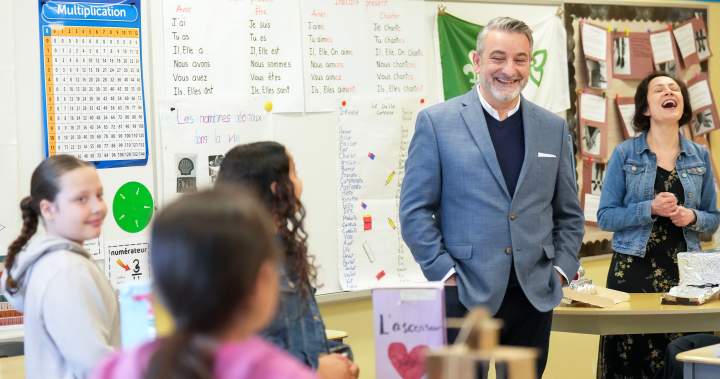Trustees at Ontario’s 31 English public school boards have “no constitutional cover whatsoever” to stop the Ford government from firing them, Education Minister Paul Calandra says, as he gears up for a historical overhaul of the education system.
In a sit-down interview with Global News, Calandra outlined the government’s wide-ranging positions on the future of school boards, trustees and his desire to standardize the curriculum across the province.
“I want to deliver a more consistent level of education across the province of Ontario and maximize resources back into the classroom for teachers, Calandra said. “And come hell or high water, we’re gonna do that.”
Calandra indicated that while the government is not looking at eliminating or consolidating any of the province’s 72 school boards, he is open to overhauling hundreds of trustee positions, and blames them for creating a “polarized political cesspool” environment of “anger and frustration.”
While the minister said the restructuring isn’t exclusively about saving money, he also said he is open to “fixing the funding formula” to ensure teachers have enough resources to meet the growing class needs.
The province’s moves are being met with growing pushback from parents, trustees, and opposition politicians alike, who are suspicious of the government’s motives.
“So many parents who rely on their locally elected representatives — which are school board trustees — who rely on them to set their kids up for the new school year, have no one to turn to,” NDP Leader Marit Stiles said on Tuesday.
“Minister Calandra is shutting out parents and families from local school decisions that will impact their communities and their kids.”
Calandra was quick to promise all 72 separate school boards across the English, Catholic and French systems would remain in place. Rumours of collapsing the boards into just four institutions, he said, are categorically untrue.
In fact, Calandra praised the French and Catholic boards for outperforming their English counterparts in terms of standardized testing. He said he wanted to avoid the headaches that eliminating them could cause.

Get breaking National news
For news impacting Canada and around the world, sign up for breaking news alerts delivered directly to you when they happen.
“I have no interest in opening up constitutional battles over education,” Calandra explained. “I like a form of competition within the system; I think it’s healthy that parents do have a choice.”
Collapsing all boards into four might save money, Calandra said, but he suggested the savings would be lower than people expected. Despite hammering trustees for individual trips and expenses, the education minister said his reforms aren’t necessarily about saving money.
“Everybody’s really focused — and maybe that’s my fault — on saving, savings, savings, but as I’ve said to the supervisors, you go in there and you tell me if my funding formula isn’t good enough, then we’ll fix the funding formula,” he said.
Instead, he’s taking aim at the politics of trustees, which he believes has “become a polarized political cesspool of anger and frustration.”
The Canadian constitution, which enshrines linguistic and religious rights across the country, offers certain trustees protection from the government’s most aggressive reforms.
Trustees at French language boards will remain in their roles untouched by reforms, Calandra said, stressing the potential legal battles changing their protected roles could spark.
“The French language rights — guaranteed to have their own representation, guaranteed to have elected trustees,” he explained. “It’s a constitutional right that we have no desire to infringe on.”
Catholic students are entitled to religious representation, which is also protected. The broader mandate of Catholic trustees to manage larger parts of the board, however, could be reigned in.
“The Catholic system also has a similar guarantee,” Calandra said. “Catholics have the right to be educated in a Catholic school, denominational issues are to be dealt with by elected trustees. That is a constitutional right that we have no intention of infringing on.”
The Ministry of Education “will look at removing” other powers Catholic trustees have “so that they can focus solely on denominational issues,” Calandra said.
“The rest of the decision-making would be out of their hands.”
The constitutional protection enjoyed by French and Catholic trustees, however, doesn’t extend to the English public system, which Calandra now has squarely in his sights.
“The public school trustees have no constitutional cover whatsoever,” the education minister told Global News. “They could very well be eliminated by the end of the year, absolutely … I’ve made no final decision on that.”
Firing all English trustees, critics have said, would leave parents without democratically elected advocates in school boards. The Ontario NDP called trustees a “lifeline” parents rely on to advocate for reform and assist with students.
Calandra said local MPPs would be able to assist, along with parent representatives at the school level.
“They can continue to do that through their provincial members of parliament,” he suggested. “They can continue to have roles through parent councils, which I see becoming even more important in a system if it’s changed.”
The planned reforms, which Calandra said he hopes to unveil before the end of the year, would centralize and standardize large parts of the system at Queen’s Park.
“I’ve asked my department for a full review of curriculum,” he said.
“The curriculum — that should be standardized. We’ve done some standardized testing obviously through EQAO, but I think there are other parts of delivering the education and what kids are learning that can be standardized and developed by the province and disseminated across all 72 boards.”
Read the full article here

